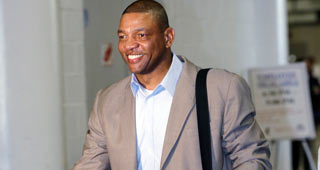By any metric the Eastern Conference has struggled over the past two decades in regards to their depth of quality teams. The situation has reached a tipping point this season with a model by Arturo Galletti of BoxScoreGeeks.com showing the possibility of only the Miami Heat and Indiana Pacers finishing with a record above .500.
There are a plethora of factors on why the Western Conference is better this season, from greater parity at the top of the table compared to the separation the Heat have created over their four seasons together and the cyclical nature of several Eastern Conference teams rebuilding at the same time.
From a long-term perspective, the Eastern Conference has won the lottery in 11 of the past 15 years, suggesting several teams in the East have had ample opportunities to rebuild.
But last year's All-NBA Teams had 11 of 15 from the West, nine of 15 in 11-12 and 10-11, 11 in 09-10, 08-09 and 07-08.
One element that has remained constant is that weather plays a significant role in where veteran free agents choose to sign. The Heat have attracted significantly more high profile free agents to play with LeBron James than ever was possible when he was with the Cleveland Cavaliers.
The Los Angeles Lakers, Phoenix Suns and San Antonio Spurs always had a competitive advantage in signing veteran free agents during the previous decade that was more difficult during Kevin Garnett's tenure with the Minnesota Timberwolves. With Chris Paul and Doc Rivers taking control of the Los Angeles Clippers, that franchise is finally taking advantage of its weather and cultural advantages.
While the two warmest winter markets are in the Eastern Conference in Miami and Orlando, the gap between the average temperature for the two conferences as a whole is statistically significant with the Western Conference being nine degrees warmer.
Superstars that are drafted by teams in cold weather franchises certainly can be retained, but their ability to build around them with complementary pieces proves more difficult. Even the Oklahoma City Thunder have not attracted as many top players on the veteran's minimum as one would guess based on the caliber of their roster and title chances. Oklahoma City is not one of the coldest markets, but is more than 20 degrees colder than Los Angeles in January and doesn't offer some of the cultural attributes of a Chicago or New York.
Eastern Conference Average Temperature in January
Indiana Pacers: 26.5
Miami Heat: 68.1
Atlanta Hawks: 42.7
Washington Wizards: 34.9
Chicago Bulls: 22.0
Charlotte Bobcats: 41.7
Detroit Pistons: 24.5
Toronto Raptors: 21.0
Orlando Magic: 61.3
Boston Celtics: 29.3
Philadelphia 76ers: 32.3
Cleveland Cavaliers: 25.7
Brooklyn Nets: 32.1
New York Knicks: 32.1
Milwaukee Bucks: 20.7
- Average Temperature for Eastern Conference: 34.3
Western Conference Average Temperature in January
Portland Trail Blazers: 39.9
San Antonio Spurs: 50.3
Oklahoma City Thunder: 36.7
Los Angeles Clippers: 57.1
Denver Nuggets: 29.2
Golden State Warriors: 48.7
Dallas Mavericks: 44.1
Phoenix Suns: 54.2
Los Angeles Lakers: 57.1
New Orleans Pelicans: 52.6
Memphis Grizzlies: 39.9
Minnesota Timberwolves: 13.1
Sacramento Kings: 46.3
Utah Jazz: 29.2
Houston Rockets: 51.8
- Average Temperature for Western Conference: 43.3



